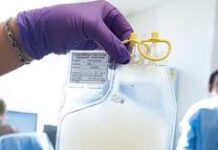
To be told that you or someone you love has cancer is dreadful news.
Today, one in every two people in this country can expect to be told they have cancer at some point in their lives.
For some, that means a terminal diagnosis. But we can look forward to a time when cancer, with the suffering and loss that is so bound up with that word, will lose some of its power to create fear.
That goal can only be reached with a clear-sighted approach and the resources, dedication and hard work of researchers and trained professionals.
Optimistic targets aren’t enough. Four years ago, the NHS Long Term Plan set a new ambition that by 2028 the proportion of cancers diagnosed at stages 1 and 2 would rise from around half to three-quarters of cancer patients.
The Expert Panel that provides independent evaluation to the Health and Social Care committee rated the Government’s progress on this pledge to be “requires improvement”.
Our report on cancer services (published in April 2022) had a similar message for ministers – the Government was off track to meet its goal; a goal that we know offers the single most effective way to improve cancer survival.
Reducing the number of people waiting longer than 62-days to begin treatment for cancer is crucial.
It was very disappointing to be told by NHS England that its target to reduce numbers to pre-pandemic levels by March this year was not expected to be met until March 2024.
For those waiting, that means counting the days then the weeks and the months.
So where does the solution lie to getting back on track? Innovation is at the core of the ambitions on cancer in the NHS Long Term Plan.
The NHS Cancer Programme acknowledges that achieving them will rely on harnessing the latest technology and newest approaches to cancer diagnosis, as and when they are discovered.
To back up its intention, the NHS runs an annual Innovation Open Call competition to identify and grow the most promising innovations.
Our committee recognises the value and potential of this approach. We’re currently holding an evidence-based inquiry, Future cancer, to identify innovations with the greatest potential to transform cancer diagnosis and treatment in the short, medium and long term.
Our focus is on how those innovations can be transitioned into frontline clinical settings and what we can learn here from international examples of best practice.
Members of this committee will be making recommendations to Government that build on the science to enable the next crucial step – to turn research into new technologies and treatments.
But so much more can be done to limit the number of people who will go on to develop cancer.
The current consensus is that around 40% of cancers are preventable – that’s around 135,000 cases in the UK every year.
An obvious target is reducing smoking – a risk factor in so many cancers, including lung, mouth, throat, stomach and liver. Cancer prevention is a key workstream in our major inquiry on preventing ill-health.
I believe that the future sustainability of the NHS rests on us getting prevention right.
However, this Committee’s case to Government on cancer was that neither earlier diagnosis, nor prompt treatment, would be possible without tackling a crisis in its workforce.
The NHS was estimated, on a full-time equivalent basis, to be short of 189 clinical oncologists, 390 consultant pathologists and 1,939 radiologists, and likely to be short of 3,371 specialist cancer nurses by 2030.
We called for a long-term and short-term plan to fix it. It is welcome to see many of the Committee’s recommendations reflected in NHS England’s Long Term Workforce plan.
This puts an emphasis on cancer, particularly faster diagnosis – with more medical students expected to complete their training in cancer services to tackle shortages.
If we are to truly transform cancer care, alongside a strengthened workforce, we need to quickly translate innovative science into new treatments – while helping prevent people getting the disease in the first place.
Only then can we strive towards a future where cancer loses its power to create fear.








